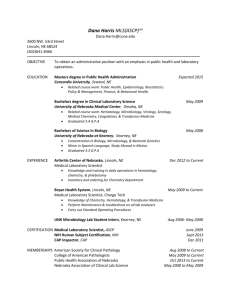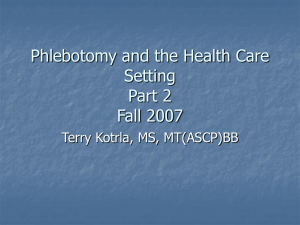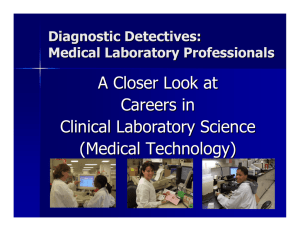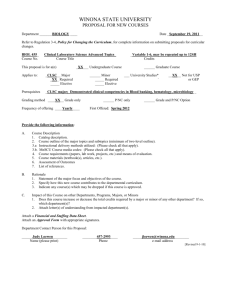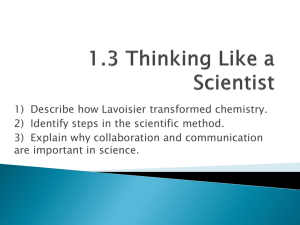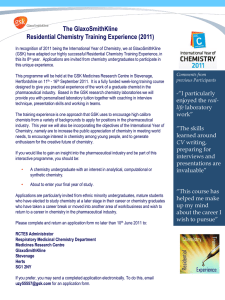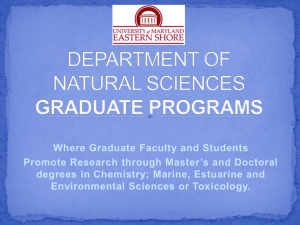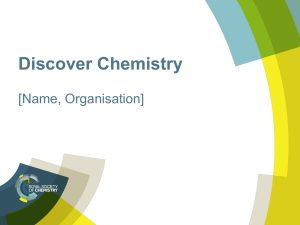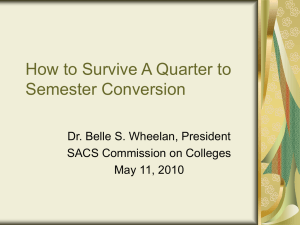Medical Technology - University of Washington
advertisement
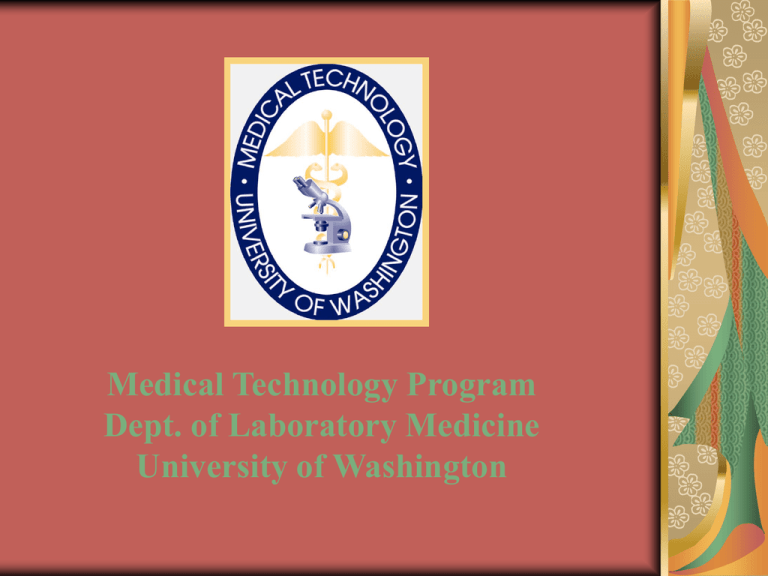
Medical Technology Program Dept. of Laboratory Medicine University of Washington Overview •Description of Medical Technology Career • Description of Medical Technology Program • A Glimpse of Med Tech Student Life Medical Technology (Clinical Laboratory Science) What is Medical Technology? Medical Technology is where basic laboratory science meets the practice of medicine. Also known as Clinical Laboratory Science, this is a critical part of health care, as the results obtained by diagnostic laboratory tests done on patient samples of blood, other body fluids, or tissue are vital tools for physicians in their diagnosis, treatment, and prevention of disease. As much as 70-80% of the factual data physicians use in evaluation of patients is generated by the clinical laboratory. What is a Medical Technologist? An individual with a Bachelor of Science in Medical Technology who is educated in laboratory techniques and instrumentation used in the diagnosis and evaluation of disease and who has a strong knowledge of human body systems and related diseases and disorders. What do Medical Technologists do? • Perform analytical tests on patient specimens • Collect and process the specimens • Analyze the data generated by clinical laboratories determining if there are any discrepancies • Work with new techniques and new instruments • Use information systems such as computers Medical Technology also includes: • Interacting as health care professionals with: Patients Laboratory Personnel Other Health Care Professionals, such as MD’s, nurses, etc. The public • Behaving professionally which includes: Ethical and moral beliefs to gain the trust of professional associates Confidence of the patient Medical Technology does NOT include a lot of interactions directly with patients Where do Medical Technologists Work? Most Medical Technologists work in: • Clinical laboratories in medical centers, hospitals, or clinics Other Medical Technologists: • Forensic Science • Computers in Laboratories • Laboratory Sales Representative • Research • Other Health Professions These are just a few examples of the many varied and unique job opportunities available to Medical Technologists Clinical Laboratory Divisions: The Main Areas of Medical Technology Blood Banking/Immunohematology Chemistry Hematology & Coagulation Immunology Microbiology Blood Banking (Immunohematology): • Perform crossmatch to identify compatible blood for patients who are bleeding or for surgery. • Some people have unusual blood types and a detailed evaluation must be performed. Chemistry: Analyze the chemical composition of serum (the liquid portion of the blood). Includes testing for therapeutic drugs, drugs of abuse, and diseases of organs (heart, liver, pancreas) and organ systems (endocrine). Hematology & Coagulation: Blood cells are counted, stained, and examined. Leukemia and other disorders are diagnosed. Also includes tests to evaluate the ability of the blood to clot. Immunology: •Tests to evaluate the immune response (appropriate response to infecting agent or improper response like rheumatoid arthritis) Microbiology: Bacteria are grown on agar plates and identified. Bacteria are also tested for sensitivity to antibiotics. May include identification of viruses, parasites and fungi. Why become a Medical Technologist? Educated as a generalist, so lots of variation. LOTS of available jobs!!! There is a shortage of Medical Technologists nationally and internationally Competitive Salaries (starting pay ~ $50,000/year) Part-time/Full-Time/Various Shifts Fulfilling, Satisfying, & Rewarding What about career advancement with a BS in MT? Lab supervisor/manager Graduate School (M.S., Ph.D.) Professional School (M.D., D.D.S., Pharm. D., etc.) Law School Business School How do I become a Medical Technology major at UW? Contact: medtech@u.washington.edu or 206.598.2162 Get an application packet and more information at: www.depts.washington.edu/labweb/Education/MedTech What are UW Medical Technology Program Admission Requirements? • Junior status (all prereq’s complete or in progress) • Minimum Cumulative GPA of 2.0 required • Minimum Science GPA of 2.0 required • Class accepted in 2008, mean GPA = 3.4 • Class accepted in 2009, mean GPA = 3.3 • Application DEADLINE: Feb. 15th each year What does a complete application consist of? Application Form Personal Essay/Statement Official Transcripts of ALL college coursework Three Evaluation Forms Signed Essential Requirements Form Signed Washington State Patrol Criminal Background Check and Self-Disclosure Forms *Interview* The Program… 2 + 2 Bachelor of Science Program 1. Pre-professional Phase: 90 quarter hours of prerequisite and general education coursework 2. Professional Phase (7 quarters): Didactic Year (4 quarters) and Clinical Internship Year (3 quarters) Pre-Professional Prerequisites: General Biology: 180, 200, 220 General Chemistry: 142, 152, 162 Organic Chemistry: 223 & 224 or 237, 238, 239 One Math Course: Statistics 220 or Math 124 Biology 118: Human Physiology Plus the General Education courses required for graduation *Note: Take entire series at the same educational institution Medical Technology Program Junior Year Winter Quarter: LABM 321 - Hematology MICRO 442 – Bacteriology Autumn Quarter: MICRO 443 – Bacteriology Lab LABM 322 - Chemistry LABM 427 -Selected Topics BIOCHEM 406 - Biochemistry IMMUN 441 - Immunology BIOCHEM 405 - Biochemistry Summer Quarter: LABM 421- Medical Micro LABM 426 - Immunohematology Spring Quarter: LABM 418 - Chemistry MICRO 444 - Mycology & Parasitology MICRO 445 - Virology Medical Technology Program Senior Year Autumn and Winter Quarters – Courses & Clinical Rotations: 6 weeks LABM 419 – Coagulation 6 weeks LABM 420 – Analysis of Body Fluids 6 weeks Clinical Chemistry 6 weeks Clinical Hematology and Coagulation 6 weeks Clinical Microbiology Spring Quarter - Elective: 1 week Phlebotomy 1 week Blood Bank 8 weeks - Research, Specialist, Generalist, or Outreach Strengths of the MTP Excellent Education: In depth knowledge of health and disease. Small Size of Program: Students get to know each other and the faculty. Several Scholarships available exclusively for MTP students: departmental and national. Very good Pre-Med major. Students are well prepared for the ASCP certifying exam. Med. Techs are in High Demand: Many jobs waiting after graduation offering competitive salaries. At UWMC a new MT graduate starts at $48,384 per year. The work of Medical Technologists is vitally important—without laboratory tests and results healthcare would be severely limited. Patient lives depend on accurate laboratory results. There is so much variety is this field!!! From Microbiology to Hematology to Chemistry to Bloodbanking and the sub-specialties within each of these specialties. It is astounding how much students learn in this program and how well prepared they are to enter the field directly after graduation. A Glimpse at Med Tech Student Life... Autumn Quarter, Junior Year Chemistry Student Lab Winter Quarter, Junior Year Hematology Student Lab Summer Quarter Junior Year Microbiology Student Lab Med Tech Senior Year Clinical Rotations GRADUATION !!! Medical Technology Program Contact Information Email: medtech@u.washington.edu Office: UWMC, NW120 Phone: 206.598.2162 Website: www.depts.washington.edu/labweb/Education/Medtech
